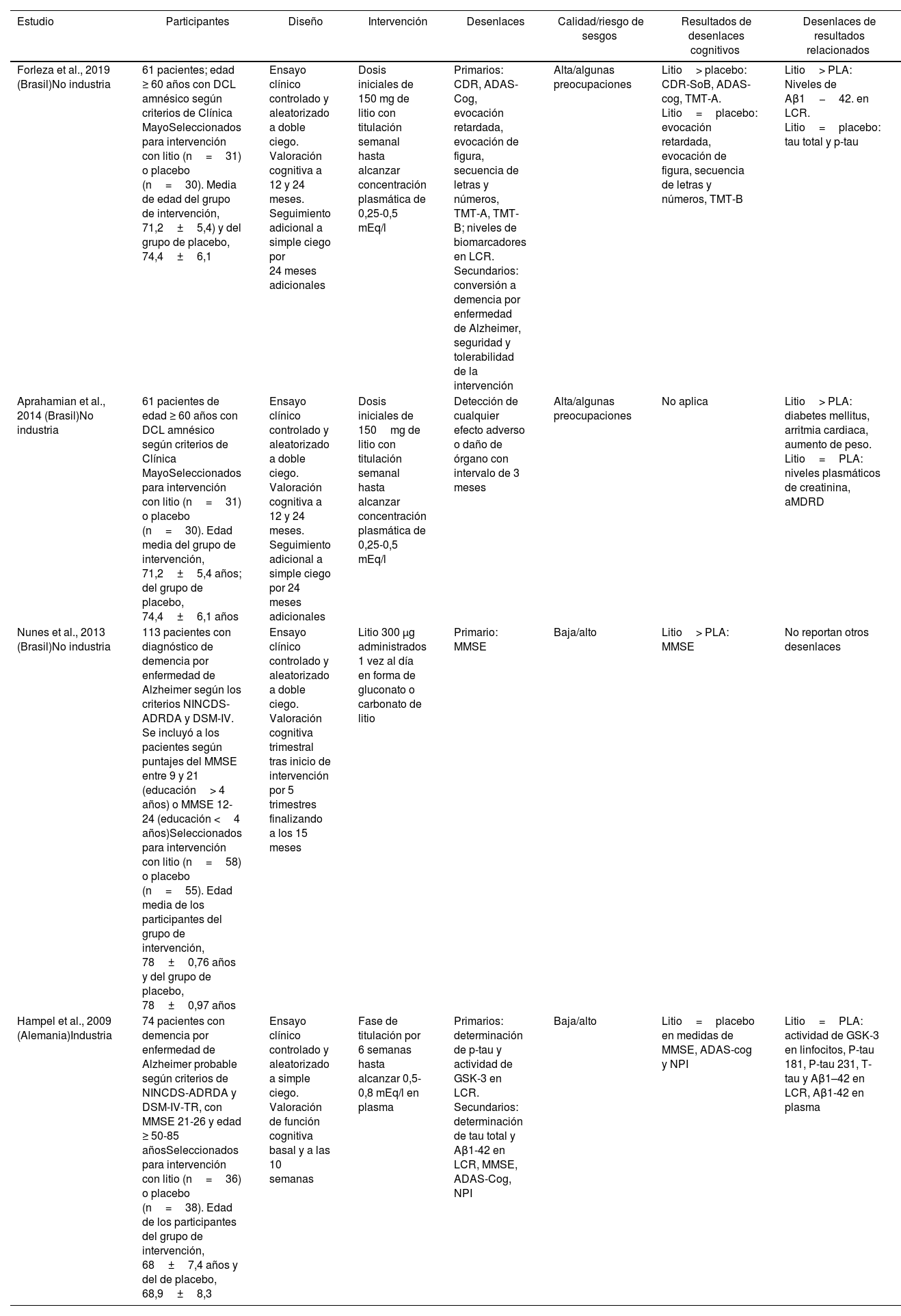La enfermedad de Alzheimer es una entidad neurodegenerativa más prevalente en el mundo. Los tratamientos actualmente disponibles son escasos y tienen efectos discretos. Se ha demostrado que el litio disminuye el deterioro cognitivo de las personas con trastorno afectivo bipolar. Sin embargo, los estudios que evalúan el litio para el deterioro cognitivo en la enfermedad de Alzheimer continúan en controversia.
MétodosSe llevó a cabo una búsqueda sistemática de la literatura en PubMed, EMBASE, la Biblioteca Cochrane, LILACS y Google Scholar, entre el 30 de abril y el 10 de mayo de 2021. Se incluyeron ensayos clínicos controlados y aleatorizados (ECCA) que evaluaron la eficacia y la seguridad del litio como tratamiento del deterioro cognitivo en personas con demencia y deterioro cognitivo leve por enfermedad de Alzheimer. El desenlace primario fue la diferencia en el funcionamiento cognitivo al final del estudio. Dos autores seleccionaron los estudios y extrajeron los datos. Se calcularon las diferencias de medias estandarizadas (DME) en las variables continuas y el riesgo relativo (RR) en las variables dicotómicas. Para el procesamiento de los datos, se utilizó el software Review Manager 5.4.
ResultadosSe identificaron 2.078 reportes y se incluyeron 3 estudios con datos de 248 participantes. Un cuarto reporte se incluyó para el análisis de seguridad. Comparado con placebo, no se encontró una diferencia significativa en el desempeño cognitivo de los pacientes con deterioro cognitivo leve o demencia por enfermedad de Alzheimer que recibieron tratamiento con litio (SMD=–0,39; IC95%, –0,82 a 0,04; I2=53%; n=195). No hubo diferencias en la tasa de interrupción por cualquier causa (RR=0,90, IC95%, 0,46-1,78; I2=0%) y la tasa de efectos adversos entre el litio y placebo (RR=1,29, IC95%, 0,83-2,03; I2=0%).
ConclusionesLa evidencia actual es insuficiente para asumir algún efecto del litio como tratamiento del deterioro cognitivo en la demencia por enfermedad de Alzheimer. Es necesario diseñar más estudios de mejor calidad para justificar la prescripción de litio para esta población en la práctica clínica. Dada la toxicidad del litio, debe garantizarse una adecuada preselección de los pacientes y un estrecho seguimiento.
Alzheimer's disease is the most prevalent neurodegenerative disease worldwide. Currently available treatments are scarce and have modest effects. Lithium has been shown to decrease cognitive impairment in people with bipolar affective disorder. However, studies evaluating lithium for cognitive impairment in Alzheimer's disease remain controversial.
MethodsWe conducted a systematic search of the literature using PubMed, EMBASE, the Cochrane Library, LILACS, and Google Scholar between 30 April and 10 May 2021. Randomised controlled clinical trials (RCTs) conducted to evaluate the efficacy and safety of lithium as a treatment for cognitive impairment in people with dementia and mild cognitive impairment due to Alzheimer's disease were included. The primary outcome was the difference in cognitive functioning at the end of the study. Two authors selected the studies and extracted the data. We calculated the standardised mean differences (SMD) for continuous variables and the relative risk (RR) for dichotomous variables. Review Manager 5.4 software was used for data processing.
Results2,078 reports were identified and 3 studies with data from 248 participants were included. A fourth report was included for safety analysis. Compared to placebo, no significant difference was found in the cognitive performance of patients with mild cognitive impairment or dementia due to Alzheimer's disease receiving lithium treatment (SMD=–0.39; 95%CI, –0.82 to 0.04; I2=53%; n=195). Also, significant differences were not found in the rate of discontinuation for any cause (RR=0.90; 95%CI, 0.46-1.78; I2=0%), and the rate of adverse effects between lithium and placebo (RR=1.29; 95%CI, 0.83-2.03; I2=0%).
ConclusionsThe current evidence is insufficient to assume any effect of lithium as a treatment for cognitive impairment in Alzheimer's disease dementia. It is necessary to continue building better quality studies to justify the use of lithium in this population in clinical practice. Given the toxicity of lithium, adequate pre-selection of patients and close monitoring should be ensured.











